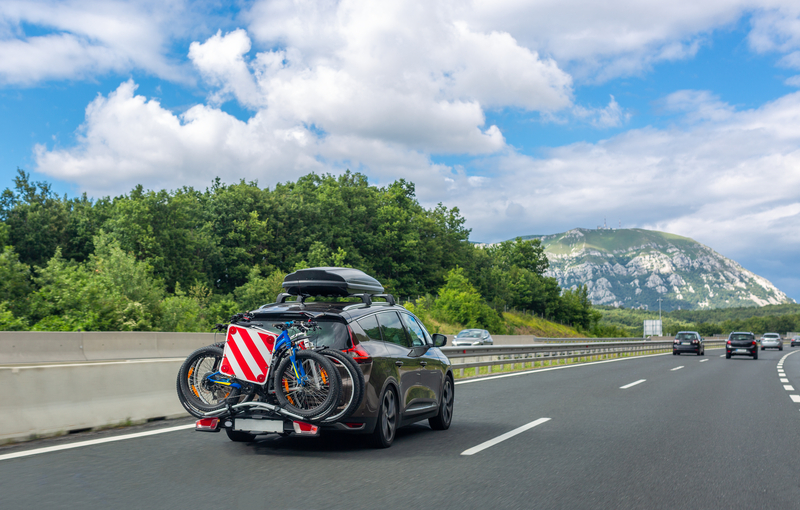Bike racks, cargo carriers add to road trip fun

You've mapped out the journey and set aside all of the items needed to make your trip comfortable and fun. How do you pack all that stuff alongside your family?
"A lot of people don't realize you can put a trailer hitch on a small car," said John Bauer, founder of Rack N Road stores. "Then you can tow up to 2,000 pounds, and that's a couple of jet skis, canoes or bikes."
Drivers have a wide array of choices when it comes to packing all that extra equipment, ranging from roof-mounted cargo baskets to small trailers that can be pulled behind just about any car.
Small cargo trailers can carry a large amount of gear and add almost no wind resistance. "They generally don't have much effect on vehicle fuel economy," Bauer said.
Roof racks are popular for carrying bulky items like kayaks or canoes. They allow drivers to carry their gear without a trailer, but wind resistance can rob gas mileage, Bauer said.
Rooftop storage baskets are also popular for extra cargo that doesn't fit in the vehicle. While Bauer did not recommend cargo baskets for winter travel, since they don't protect contents from the elements, they are more popular in sunny climates such as California.
"Before buying a rooftop basket, you want to think about where you'll be taking it," Bauer said. "Baskets might be OK for California, but if you plan on driving to wetter areas, they might not be the best option."
Another option is an enclosed rooftop cargo carrier. By closing and locking, it not only protects from the weather, but also keeps opportunistic thieves from knowing what's inside.
"They are secure," Bauer said. "I haven't seen one that was broken into during my 20 years in this business."
How do you choose a rooftop cargo carrier? Bauer recommended getting one that is shorter than your vehicle's roofline.
"Any part of it hanging over the windshield will cause added drag," Bauer said. Also, make sure that it doesn't hang over the back and get in the way of a hatchback.
Some cargo carriers can be mounted on a trailer hitch. They are smaller, but give almost no wind resistance.
"The hot item right now is the type that mounts to the factory crossbars," Bauer said. "You can drive in with your vehicle's standard crossbars and get it mounted."
What about carrying bicycles? A new type of hitch-mounted rack offers trays for the wheels and a bar that clamps to the bike's frame. This type of rack allows all types of bicycles to be carried, whereas the traditional hitch-mounted carriers have trouble carrying women's, children's and cruiser bikes.
"Drivers need to be aware that their vehicles are longer with hitch-mounted bike racks," Bauer said "With roof racks, drivers need to remember that their vehicles are taller.
"Watch out for low parking garages or even your own garage. We see people come in about once a week with damaged racks because they forgot.
Also, tie-downs can help keep large items such as a boat or kayak from becoming airborne.
"At 70 miles per hour, the wind force hitting the windshield and going to the bottom of the boat is a couple hundred pounds," Bauer said. "Tie-downs nullify that force."
How do you choose the right storage solutions? Bauer offered the following suggestions:
- Check out small cargo trailers for long-distance travel. They provide convenient storage for almost any-sized vehicle, even small cars. All it takes is a hitch.
- Bulky items can be accessed quickly on roof-mounted cargo baskets or enclosed cargo boxes. It helps eliminate clutter inside the vehicle passenger cabin.
- Use enclosed and lockable containers if you are going on vacations. They keep items safely out-of-sight and keep your cargo from exposure to elements such as rain and sap.
- Hitch-mounted cargo containers or bike racks give some extra storage without adding wind resistance or affecting gas mileage.
- Roof racks provide easy storage for sports equipment such as bicycles, canoes and kayaks. These may be added to your vehicle's existing crossbars.
- Use tie-downs from the bow and stern of the boat to the car's roof when carrying a canoe or kayak on a roof rack.